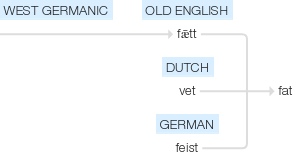Fat
Old English fǣtt ‘well fed, plump’, also ‘fatty, oily’, of West Germanic origin; related to Dutch vet and German feist .
wiktionary
From Middle English fat, from Old English fǣtt(“fatted, fat”), from Proto-West Germanic *faitid(“fatted”), originally the past participle of the verb *faitijan(“to make fat”), from *fait(“fat”).
From Middle English fat, from Old English fæt(“vat, vessel, jar, cup, casket, division”), from Proto-Germanic *fatą(“vessel”), from Proto-Indo-European *pod-(“vessel”). Cognate with Dutch vat(“barrel, vessel”), German Fass(“barrel, drum”), Swedish fat(“barrel, dish, cask”). See vat.
etymonline
fat (adj.)
Old English fætt "fat, fatted, plump, obese," originally a contracted past participle of fættian "to cram, stuff," from Proto-Germanic *faitida "fatted," from verb *faitjan "to fatten," from *faita- "plump, fat" (source also of Old Frisian fatt, Old Norse feitr, Dutch vet, German feist "fat"), from PIE *poid- "to abound in water, milk, fat, etc." (source also of Greek piduein "to gush forth"), from root *peie- "to be fat, swell" (source also of Sanskrit payate "swells, exuberates," pituh "juice, sap, resin;" Lithuanian pienas "milk;" Greek pion "fat; wealthy;" Latin pinguis "fat").
Meaning "abounding in comforts, prosperous" is late 14c. Teen slang meaning "attractive, up to date" (also later phat) is attested from 1951. Fat cat "privileged and rich person" is from 1928; fat chance "no chance at all" attested from 1905, perhaps ironic (the expression is found earlier in the sense "good opportunity"). Fathead is from 1842; fat-witted is from 1590s; fatso is first recorded 1943. Expression the fat is in the fire originally meant "the plan has failed" (1560s).
Spanish gordo "fat, thick," is from Latin gurdus "stupid, doltish; heavy, clumsy," which also is the source of French gourd "stiff, benumbed" (12c.), engourdir "to dull, stupefy, benumb" (13c.).
fat (n.)
"fat part of anything," mid-14c., from fat (v.). Cognate with Dutch vet, German Fett, Swedish fett, Danish fedt. As a component of animal bodies, 1530s. Figurative sense of "best or most rewarding part" is from 1560s. Expression the fat is in the fire originally meant "the plan has failed" (1560s).
fat (v.)
Old English fættian "to become fat, fatten," from the source of fat (adj.). Replaced by fatten except in Biblical fatted calf.
